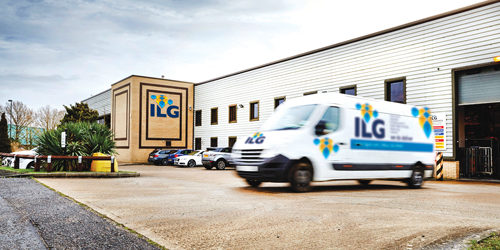
ILG was crowned Company of the Year at the Sussex Business Awards, with the category judged by Adrian Alexander from headline sponsors, Mazars. On these pages, Adrian talks to ILG Managing Director Mike Stephenson about what it is that makes the fulfilment company so special.
Adrian Alexander (AA): What does ILG do and how has it come to be so successful in its field?
Mike Stephenson (MS): ILG is a market leader in fulfilment and delivery services. In fulfilment ILG offers fully integrated IT solutions, import, storage, pick and pack, gift wrapping and delivery. In addition, ILG operates a UK and international delivery only service for businesses based anywhere in the UK. Although we operate in a highly competitive market there are very few companies that provide the portfolio of services that we do and that, coupled with a focus on quality of service and customer relationships, has helped us stay ahead of the competition.
AA: ILG has achieved circa 55% growth over the last three years. How have you achieved such phenomenal growth?
MS: Our customer base is wide-ranging from suppliers of underfloor heating to retailers of car cleaning products, travel and international education. However, we have developed a specialism in providing fulfilment and delivery services for the fashion and beauty industry with 40% of new business enquires in the last six months coming from that sector. Both of the facilities we opened in 2016 are dedicated to fashion and beauty.
AA: How do you develop new business and what performance indicators have you put in place to monitor this?
MS: We have analysed each of our services, customer need, proposition, positioning, target markets and key messages and we have identified which services, markets and locations have the potential to grow and which we will flat-line. In 2015, we invested in a rebranding exercise and for each of our services we have analysed how best to take that to market and use a range of means including PPC, social media, direct mail, trade fairs etc supported by Business Development Managers. We develop marketing campaigns targeting specific services and industries. A marketing strategy meeting is held every six weeks where we review the number of new business enquires and conversions generated by each activity.
AA: What challenges have you faced in the business over the last year or so and how have your overcome them?
MS: The two biggest challenges we have faced are rapid recruitment and training along with finding adequate facilities to manage our growth. We have looked at different sources of new recruits including increasing the number of warehouse apprenticeships and the number of part time roles as well as recruiting through the Aldingbourne WorkAid Supported Employment Programme. With the workforce growing by circa 33% training has proved a huge challenge so we have designed, developed and launched our own online training software called DRIVE Development.
On the facilities front we have had to cultivate relationships with all Sussex based property agents and local landlords to ensure we are first in line on facilities as they become available. We successfully secured 46,000 sq feet in 2016 and a further 44,000 square feet from January 2017 to help manage our growth.
AA: How has the EU referendum result in June affected your business if at all?
MS: The value of the pound has affected our customer base to some degree with those that import seeing an increase in their cost base but others who sell their products internationally experiencing an increase in e-commerce orders, particularly the high end fashion brands seeing an increase in e-commerce orders from the Asian market.
For ILG, like many businesses, the uncertainty surrounding trade tariffs is a big concern and we are currently working closely with our customer base to analyse their supply chains so that we are well placed to support their international logistics whatever the result of the negotiations.
AA: What do you see as your biggest challenges over the next year or so?
MS: All the current indicators are that the business will continue to grow in the next year or so and therefore the biggest challenges are not dissimilar to the challenges that we have faced in recent years. However, coupled with those is the challenge of maintaining the focus of a larger workforce on quality services and, for the management team, the uncertainty surrounding BREXIT and keeping ahead of the market in preparation for the outcome.
AA: Customer satisfaction in your industry must be key – but how do you monitor it?
MS: We have a client relationship programme managed by two senior people in our business. The levels of satisfaction are reported to the department after every meeting and four simple visual formats to the business in the monthly newsletter, on interactive TV screens and on staff notice boards.
We also measure our service performance and, most importantly, issues that may cause customer offence through our internal process improvement scheme DRIVE. All issues are assigned for someone to repair within 72 hours of the issue occurring, this drives client satisfaction, and is again, displayed in the monthly newsletter to all staff, on TVs and notice boards.
AA: How involved is ILG in working in the local Sussex Community, as part of its Corporate Social Responsibility strategy?
MS: We have adopted a CSR policy to focus our efforts in the areas where we consider the business is best placed to make a difference in the community. The first is the provision of training opportunities for local young people and each year we employ young warehouse apprentices who may not have achieved their full potential at school. In addition, we provide supported employment through the Aldingbourne Trust WorkAid programme for those on the Autistic Spectrum and/or with a learning disability. The second aspect of our CSR policy is the work we do for our local charity of the year nominated by staff. In the last three years we have raised nearly £40,000 for our chosen charities as well as supporting their storage and delivery.
AA: In terms of your employees, how do you communicate with them and how involved are they in business decisions?
MS: The retention and development of staff is our number one business objective and ‘Believing in our People’ is the first of our core values. Communication is through a number of channels but the two that have been most successful are a monthly message that for the last five years I have personally sent to all staff at the end of each month detailing our performance in that month against our core objectives. The second is the lunch that I hold every quarter with Staff Representatives from all sites to exchange ideas. I am continually impressed by the quality of feedback and the actions that result from those meetings.
AA: Without giving too much away, what are your growth plans for 2017 and the next three years?
MS: In 2017, we are opening a new flagship facility in East Grinstead which will provide another 44,000 square feet of storage in addition to impressive office and rest break areas. Over the course of the year, all new business will go into this facility which we expect to result in the creation of around 60 new jobs. The continued growth of e-commerce and particularly the growth of the UK fashion & beauty industry means that we continue to forecast the level of growth experienced in the last three years.
www.ilguk.com
mazars.co.uk






